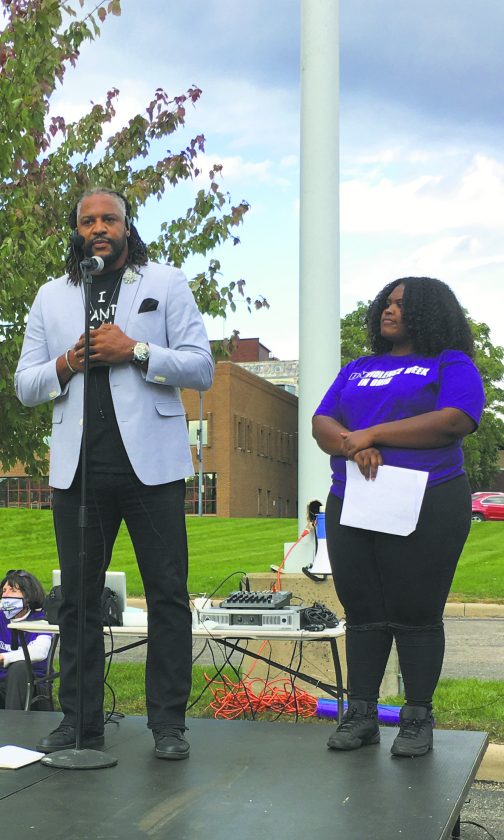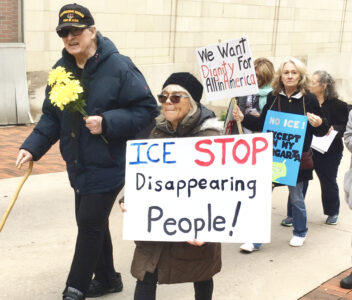Valley parade, rally put accent on nonviolence

YOUNGSTOWN — The root causes of violence can be complex and extend many tentacles, but stopping its spread often requires a few mental adjustments, a longtime community leader says.
“We just need to focus on the principles of nonviolence more than ever,” Penny Wells, Mahoning Valley Sojourn to the Past’s executive director, said. “Talking nonviolence means in words and deeds; most violence is precipitated by hateful language. Think before you speak, and think how nonviolence will cut down on verbal violence, which will cut down on physical violence.”
Those were the key underlying themes of Sunday’s 10th annual Nonviolence Parade and Rally, which began at Wick Avenue and Wood Street and proceeded through downtown Youngstown for a 90-minute program at the Covelli Centre.
Mahoning Valley STTP hosted the event, in which most participants drove their vehicles in the parade and remained there throughout the program because of COVID-19 concerns. Sojourn students, however, led the parade on foot.
“We have to have hope and to be courageous and think differently,” said Janae Ward, a Youngstown State University senior and social-work major who came up with the idea for the yearly gathering. “We have to change the way we think so we do not become haters.”
Given the level of violence in today’s society, it’s imperative that those trying to bring about social change are “radically nonviolent” in getting such a message out, Ward explained.
Acting as the program’s master of ceremonies was Miah Pierce, 17, a Youngstown Rayen Early College senior who in 2019 went on Sojourn to the Past, a Millbrae, Calif.-based weeklong traveling American history course to key civil rights sites in the Deep South.
“When I met Congressman John Lewis last year (on Sojourn), he said, ‘I want to build bridges, not walls,'” Pierce remembered about the late U.S. representative and civil rights icon who died July 17 at age 80 from cancer.
She also reminded attendees of the pivotal 1963 Birmingham Children’s Crusade in Birmingham, Ala., in which several thousand children who marched while using the tactics of nonviolence were arrested for marching without a permit. Despite the mass arrests, as well as facing vicious dogs and water hoses, their actions contributed greatly to desegregating what many historians deemed America’s most segregated city.
“I learned that I can make a difference, even as a teenager,” she added.
Youngstown City Schools’ CEO Justin Jennings asked participants to remember George Floyd, Breonna Taylor and Rowan Sweeney, 4, of Struthers, who was fatally shot Sept. 21 in his Perry Street residence. Sunday would have been his 5th birthday.
“His parents will never get an opportunity to see him cross the stage in high school to get his diploma,” Jennings said, adding that Rowan also will miss out on many other major life moments.
Nonviolence also is about changing some people’s hearts, regardless of their color, race, sexual orientation or other constructs, he continued.
Youngstown city Councilman Julius Oliver, D-1st Ward, recalled how having been exposed to violence at a young age eventually molded his determination to act the opposite.
On a larger scale, rather than being happenstance, a lot of violence is the result of a system that is designed to oppress certain people — and from which others gain financially from police brutality, for example, he contended. Banks make money from settlements related to such violence, Oliver explained.
“A lot of our problems are systemic, and they’re rooted in policy,” he said, adding it’s more crucial than ever to have people step up to disrupt such a system then rebuild it.
Youngstown State University President Jim Tressel cited Dr. Martin Luther King Jr.’s six principles of nonviolence, which state the philosophy is a way of life for courageous people and that it seeks to win friendship and defeat injustice, not people. The other principles say nonviolence holds that suffering can educate and transform, chooses love instead of hate and believes the universe is on the side of justice.
Tressel praised the university for displaying a culture of diversity, love and growth, and said that during difficult times, it’s important to return to the “fundamentals” that include the six principles.
Tackling violence also entails the community coming more closely together and people laying aside their differences, said Youngstown Mayor Jamael Tito Brown, who recently spoke at the funeral for a young man with whose mother Brown had gone to school.
“Teach peace and nonviolence to kids,” because too often, violence robs its victims of a second chance, the mayor continued.
Ke’Lynn Dean, a YSU freshman, said the May 25 police killing of George Floyd in Minneapolis woke up many to the realities of racism in America. If more people had a deeper knowledge about slavery’s 400-year history in this country, they likely would become more active in fighting racism, he added.
Meri Johnson, a Mahoning Valley STTP member, talked about white privilege, which is a set of unearned societal advantages that often benefit white people over those of color. As a white person, she doesn’t worry about wearing a hooded sweatshirt and having a store employee follow her while assuming she will steal something, or being unarmed and shot by police, Johnson said.
Additional remarks came from Mason Green, a YSU sophomore and business major, and Samantha Dyson, a junior who’s on the university’s track-and-field team.
In short, it’s imperative to further work to change violent language and actions without attacking the person, said Wells, who also thanked the Rev. Ken Gifford of Poland United Methodist Church for providing the equipment for the program.
news@tribtoday.com

